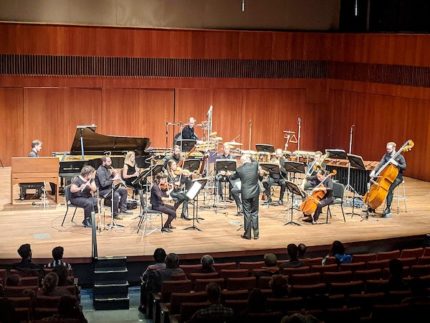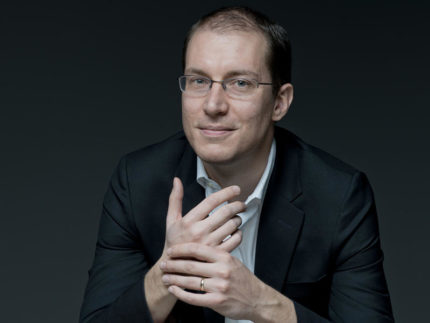Grossman Ensemble opens UChicago Presents season with bracing tribute to Knussen and Benjamin

The University of Chicago Presents Series opened its 2022-23 season—on a rare Saturday night—with a concert by the Grossman Ensemble, the new-music house band of the school’s Chicago Center for Contemporary Composition (CCCC).
The “tribute concert” at the Logan Center feted a pair of English composer-conductors who are near-contemporaries: Oliver Knussen (1952-2018) and George Benjamin (b. 1960).
The evening began with Knussen’s Ophelia Dances, Book I for ten musicians. The eight-minute work, which mines motifs from Schumann and Debussy, reflects something of Ophelia’s disordered mind in its bursts of elliptical fragments. This is early Knussen and the angular style sounds very much like music of its time (1975). The most striking passage comes near the end of the work where a glowing celeste against hushed violin and viola and a haunting horn solo seem to offer a benedictory lament for the doomed girl.
Knussen’s Songs Without Voices is of more recent vintage (1992) and shows the composer in his mature, more individual and lyrical style (though no one would confuse it with Mendelssohn). Knussen’s acerbic, fractured musical fairy tales resurface here too, yet, again, the more expressive spotlit passages stay in the memory—the second song’s cello solo, played with ardent feeling by Hannah Collins, and Andrew Nogal’s sensitive English horn solo in the fourth, written as a tribute by Knussen to Polish composer Andrzej Panufnik.
While most of the program selections were written for large chamber ensemble, the musical highlight of the evening came with George Benjamin’s Shadowlines for solo piano, performed by Gilles Vonsattel.

Cast in a single movement, this 2001 work comprises six mostly continuous sections (Vonsattel took a brief pause after each Saturday night.) The principal device is a cumulative series of canons, which may sound dry yet Benjamin explores a striking range of expression in just fifteen minutes.
Vonsattel brought a gentle impressionistic touch to the brief opening prologue, which was immediately blasted away by a chromatic burst of spiky virtuosity at the high end of the piano. Vonsattel’s concentrated playing fully conveyed the strange yet compelling landscape of this score. The explosive fourth section was delivered with daunting force and the pianist brought plaintive eloquence and an elegiac quality to the final sections. This was a bravura, richly communicative performance of a challenging score by Vonsattel, a pianist we need to hear more of in Chicago.
Augusta Read Thomas, founder and director of CCCC, was represented with her Dance Mobile (in memoriam Oliver Knussen). Written last year, the work was intended to be performed with dancers “when feasible,” which was not the case on Saturday.
Dance Mobile launches with insistent momentum and high vitality in a restless syncopated style that evokes an intriguing noirish quality, giving brief yet showy opportunities to several instruments. Yet sans the Terpsichorean element (or distraction), Dance Mobile ultimately proved insufficiently varied in its bustling busyness and the slender material felt decidedly stretched at 14 minutes.
The evening closed with Benjamin’s At First Light. Inspired by J.M.W. Turner’s painting, Norham Castle, Sunrise, the 1982 work riffs on the “melting” quality of Turner’s visual imagery, as the composer converts it into musical “transformations” and a “flowing, nebulous continuum of sound.”
Running twenty minutes, At First Light was the longest work of the evening yet Benjamin’s skillful mix of color, timbral blends and vast dynamic extremes consistently held one’s attention. Throughout its three sections, the ear was consistently beguiled in a visceral score packed with arresting musical incident for 14 players: the crash of high percussion, barely audible string tendrils, beast-like lowing of low strings and brass, a growling trombone, and astringent viola. The final section is most evocative of Turner’s painting, offering a valedictory muted trumpet before a final, whirling flourish.
Performances of all the works for large chamber forces were exemplary. The Grossman Ensemble musicians played with customary power, versatility and precision—especially the hard-working percussionist Greg Beyer in At First Light. Conductor Stefan Asbury provided a seminar in clarifying knotty textures and handling rhythmic complexities.
Rachel DeWoskin, a University of Chicago faculty member, read two of her poems (“anthrosphere” and “arrythmia”) Saturday, though any relation to the music or evening’s program seemed tenuous at best.
Quatuor Diotima performs three programs of French music in “Music from Paris” October 26-28 at the Logan Center. chicagopresents.uchicago.edu
Posted in Uncategorized

